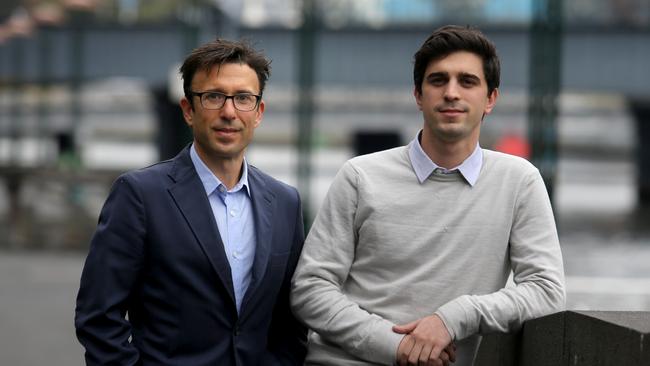Afterpay to boost stake in US offshoot with $1.25bn raising
Afterpay will increase ownership of its US subsidiary to 93 per cent, after interim global sales more than doubled.

Afterpay has claimed leadership in the hotly contested, global “buy now, pay later” industry, as the group raises $1.25bn to lift ownership of its US unit from 80 per cent to up to 93 per cent.
The share purchase from investor Matrix Partners and US employees values the US business at 28 per cent of the parent, or $10.7bn, with the parent retaining its pathway to full ownership.
Afterpay shares went into a trading halt at $134.36 before the market opened on Thursday before announcing its half-year result.
While the bottom-line loss blew out to $79.2m, from $31.6m a year ago, it was mostly attributed to the higher valuation of a minority interest in the UK business.
Co-chief executive and co-founder Anthony Eisen said the result demonstrated in several ways that Afterpay was the global leader in the BNPL industry, overshadowing its Swedish rival and Commonwealth Bank partner Klarna.
“You measure that by customer frequency as well as customer numbers, what customers are actually doing on your platform, and how that translates to merchant outcomes,” Mr Eisen told The Australian.
“We feel we’re clearly leading in that regard, but I’d also add the fact that [BNPL] is still very new so the addressable market opportunity is significant.”
The BNPL pioneer outlined plans to raising at least $1.25bn by way of unsecured, zero coupon convertible notes due in 2026. However, after strong investor demand this was expected to be increased to $1.5bn.
Proceeds are being used to increase its interest in the US-based Afterpay business to about 93 per cent, from about 80 per cent.
Brokerage UBS noted the type of raising — convertable notes over shares — was less dilutive for shareholders. But with Afterpay raising $2bn in capital since July last year, this highlighted “how much capital is required to fund Afterpay’s growth”, UBS analyst Tom Beadle said.
Afterpay revealed in its interim result that global underlying sales surged 106 per cent to $9.8bn, or $10.1bn on a constant-currency basis.
Total income spiked 89 per cent to $417.2m, driven by strong underlying sales growth across all regions, particularly in North America and the UK.
The net transaction margin rose from 2.1 per cent to 2.2 per cent, and the gross loss as a percentage of underlying sales improved by 0.3 percentage points despite record customer acquisition figures.
Encouragingly for the group, income from controversial late payment fees represented less than 9 per cent of total income, down from 15 per cent a year ago.
Afterpay said its balance sheet remained robust, with more than $1.7bn liquidity and growth capacity as at December 21.
“This position can facilitate several years of self-sustaining high growth in underlying sales,” the company said.
The number of active customers, meanwhile, reached 13.1 million, up 80 per cent on the previous corresponding period, with momentum increasing in the second quarter as active customers in the US and UK rose by 20 per cent and 23 per cent compared to the first quarter.
An average of 23,000 new customers were added to the Afterpay platform per day during the six months to December 31.
While conceding that the half-year result would flash up as a $79m loss, Mr Eisen argued that Afterpay was already “quite profitable”, with a stable net transaction margin of above 2 per cent.
“It’s not like we’re generating transactions at a loss; we’ve always been very conscious of not growing for growth’s sake,” he said.
“We’re investing into a nascent growth opportunity, so we’re growing our team, scaling our infrastructure to meet that opportunity, and we have a lot of shareholder support to do so.
“Having said that, our EBITDA was pretty significantly positive in the last half — $46m.”
However, Afterpay continues to divide the market, with massive swings in analyst valuations.
RBC Capital Markets set a price target of $107 a share compared to Afterpay’s last trade of $134.36, saying the result was a strong one with “all key metrics heading north”.
UBS, on the other hand, has a price target of only $30.
Analyst Tom Beadle said Afterpay had now raised $2bn since July, vindicating the investment bank’s view that the market continues to misprice the stock or ignore how much capital is needed to fund the company’s growth.
In a further development, Mr Eisen and co-founder Nick Molnar announced plans to establish charitable funds. Both men said they would transfer a combined total of about 950,000 Afterpay shares into their private ancillary funds from their personal shareholdings.
Mr Eisen and Mr Molnar said they would sell a small part of their holdings — up to 450,000 shares, or more than $60m each — with the proceeds used in part for charitable purposes.
The co-CEOs will maintain voting rights and control over the shares.



To join the conversation, please log in. Don't have an account? Register
Join the conversation, you are commenting as Logout